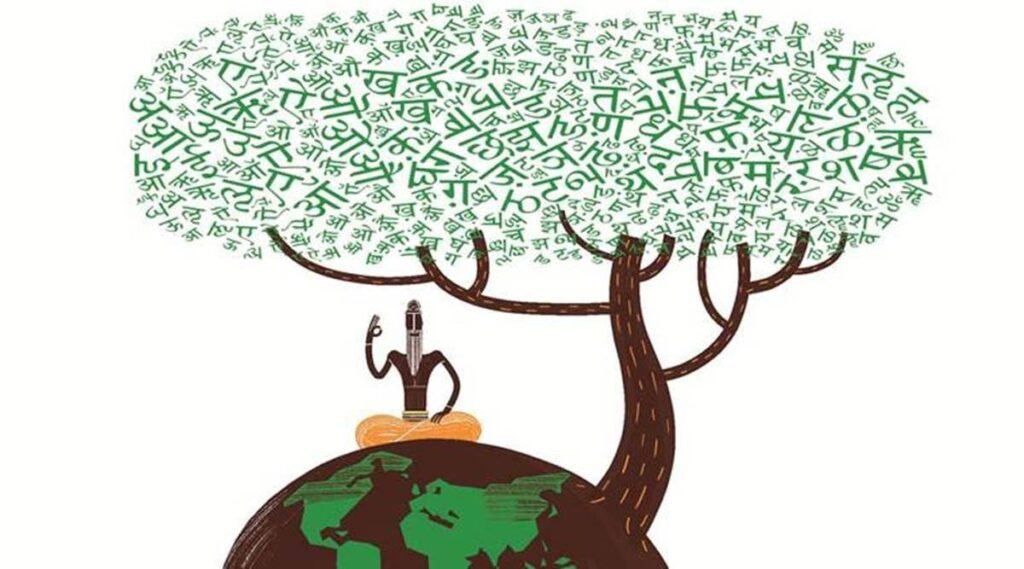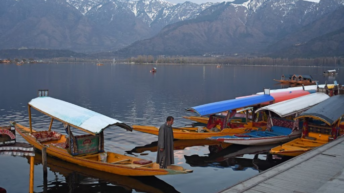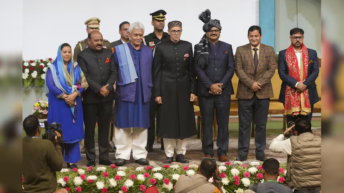|
Listen to article
Getting your Trinity Audio player ready...
|

Countries which dominate the world narrative tend to have more informed societies. At least the decision makers and the policy influencing members in the society should have this civilizational outlook. Countries like Iran, Korea, China, Japan, Germany etc have societies which are proud of their civilizational background. At times they may have bad leadership but their societies have always been conscious of their grand past and their civilizational roots.
Unfortunately in Bharat, this civilizational connect and pride in their historical past has been replaced by a sense of subservience and inferiority complex. This manifests in lingering insecurity, self-denigration and a tendency to be apologetic about heritage and origins, as also the constant need for approval from the west. This has made the people look inwards as a society, and made them risk-averse and clinging on to status-quo.
While Bharat’s civilization can offer solutions and leadership to the entire world, presently it is looking for solutions and advice from the western world. Many in the bureaucracy shudder at the thought of even minor disapproval from rating agencies of the west, be it the financial rating agencies or agencies monitoring media freedom, religious freedom, corruption etc. Most of these agencies work for the agenda of their sponsors and yet a nation of the size of Bharat shivers at even a minor rebuke from any of them. Citizens who are recognised and awarded by any non-Bharatiya institution are regarded as final authorities on many subjects whereas awardees who get honors from within the country are not respected nearly as much. Magsaysay, Nobel, Oscars and the likes are considered more important than any Bharatiya award which shows remains of a colonised mindset in the country.
Policy-Making bodies : The major policy-making bodies of the nation and its academic and research institutions flaunt their approvals from western nations or their institutions as badges of honor. Take the case of the Indian Council of Medical Research which was just toeing the line of the WHO and of Antony Fauci during the first wave of Corona virus. So much so that, for several months during the first phase of the pandemic, they did not allow Ayurvedic, Homeopathic and other streams of medicines to treat the Corona patients, though there was no proven allopathic treatment for the pandemic. This disrespect for ancient native treatment methods reflects the attitude of many in positions of authority. A similar example can be seen with the Institute of Chartered Accountants of India (ICAI), which produces some of the world’s best accounting professionals. Instead of providing its own independent policies and accounting standards based on how the economy works in the country, it has been literally carbon-copying several policies and standards adopted in the west. It has come to pass that the accounts prepared as per the Institute’s guidelines are regarded as unavoidable compliance issues rather than as any added value for business decision-makers.
Judiciary : India’s Constitution and Judiciary are largely copied from the west; whether in the focus on individual rights versus societal obligations, or consensus-driven governance versus the winner-takes-all electoral system, or disproportionate minority rights at the expense of the rights of the majority, western concepts have rubbed off into the Constitution and the Judiciary, sometimes in contradiction with Bharatiya civilizational values and experiences. The Criminal Justice system and the Law of evidence are significantly different from the way Bharatiya judicial institutions functioned for thousands of years. Several judgments, especially in the recent past, show lack of civilizational understanding. The Sabarimala judgment is a classic example of this where quotes from western experiences were mentioned in the verdict with no reference to Bharatiya Shastras or scholars.
Political arena: The political canvas is singularly focused on vote-bank politics by inducements of monetary and emotional aspects. The political discourse largely ignores the civilizational fight for survival, and lacks national and international perspectives. A Member of Parliament would be voting on several matters in the Parliament far beyond his constituency, his state, and even the country. However, as a candidate he is not informing his electorate about his views on topics of national or international importance, or even of his understanding of issues beyond his own constituency. How many candidates have views about foreign policies and how much of it do they disclose during their election campaigns? Be it the bifurcation of Andhra Pradesh or Jammu & Kashmir, 500+ MPs of other states voted on a subject they are mostly unaware or disconnected as they are generally focused on their constituency and their next election rather than real concern for the whole nation. Exceptions will always be there but this disconnect and disinterest is deep and widespread.
This lack of broader vision beyond the closed comfort zones of people is singularly hurting the growth of the nation. The sense of inferiority complex, subservience, selfishness and status-quo mentality permeates society.. The widespread lack of civilizational understanding is allowing aggressive, interventionist or expansionist nations to take advantage and stunt the progress of the nation, by exploiting our resources.
For centuries before it was subjugated and colonized, Bharat was open to trade and commerce as well as sharing of ideas. It gave so much to the world while it also took several good things from the world. During the time of occupation and colonisation, all these freedoms were lost. The experiences of those days of subjugation are still deeply embedded in the psyche of the nation. As per Angus Madison’s report, Bharat as a nation was among the top-two economies of the world, for well over 16 centuries in the past 2000 years. It declined significantly in the last 400 years and today is still struggling to match the economies of much smaller nations like Japan, Germany, the UK, France, Korea and so on.
It is important for the nation to start behaving like a civilizational society and seek its destiny through its civilizational experiences, rather than replicate the experiences of other nations, especially those that are exploitative and expansionistic.
Bharat’s Economic model: In ancient Bharat, economic policies were based on Dharma and significant importance was put on wealth creation without direct involvement of the Government in economic activities. Both the existing major economic models of capitalism and communism are exploitative, one by the market and another by the state. It is time we bring in our unique model which is non-exploitative and which is based on principles of Dharma. The Government has to abandon old socialist policies if the nation’s economy is to flourish.
Bharat’s Governance model: The democracy model being followed in Bharat needs to change if it has to survive in the long run. Every election has become a major social friction point with opposing candidates spewing venom on the opponents painting them as demons and in several instances resorting to violence. Elections now have become huge business with crores of Rupees being spent to win even a municipal councilor’s seat. Such expenditure will be recovered in big measure by the winner from his elected position. This too is unsustainable in the long run and the economy cannot bleed so much to cater to electoral corruption and promises. The twin fangs of hate and money are digging too deep into our body polity. Also, many sections like Kashmiri Pandits or Sindhis cannot elect even one Parliamentarian because of their relatively low numbers and scattered locations. So are many other communities whose voices get drowned in the cacophony of the vote-bank numbers. We have to seek solutions for this in our civilization. All sections of the society need to be represented and their voices need to be heard and accommodated. Bharat had several models of governance as described in this verse from Mantrapushpam : Sāmrājyam (Kingdom), Bhaujyam (Farmers decide policies), Svārājyam (Self-rule/ Democracy), Vairājyam (Yateeshwar/ Yogi/ Sanyasi will rule who does not have worldly attachments), Pārameṣṭhyam (God/ Bhagawan is the King and country will be ruled by his representatives), Rājyam (Principality), Māhārājyam (Empire), Aādhipatyamayam (Dictatorship). Given the complexity of the society, newer models need to be evolved which would give voice to all sections of the society.
The Bharatiya civilization offers everything humanity needs in terms of sustainable progress in the most inclusive and peaceful manner and if every citizen is conscious of this, he or she will place Bharat on the high throne as Vishwa-guru. The world will be a much better place once the Bharatiya citizens realize and adopt the wisdom from their civilization.






While this well articulated article makes clear its position , it leaves the process to achieve the success in its goals unclear and unknown.Assertting of having had a very grand and glorious past does not ensure the reestablishment of equally grandiose present with similar glory.The disconnect from past was long , gradual and inevitable though not total.It is utopian to aim to revive exactly the same as it was in the past .The situation today demands a different set of responses.Firstly intensive leadership on modern knowledge systems is essential to be achieved before ancient knowkedge can be revived.However utilizing the ancient wisdom and knowledge systems of ancient India in modern context of education by aporopriate adaptation and integration is the need of he hour. That calls for good grip on ancient knowledge systems in Sanskrit.Next step is to disseminate the same into modern
education and knowledge systems though appropriate knowledge management.How this can be achieved is not very clear though a number if well meaning efforts are being made
Best regards to the eminent writer Shri Sridhar Mamidi garu for this wonderful article on Bharatiya Civilization and its significance in providing solutions to problems in all spheres of society.
Humble pranaam,
Srinivas Rao